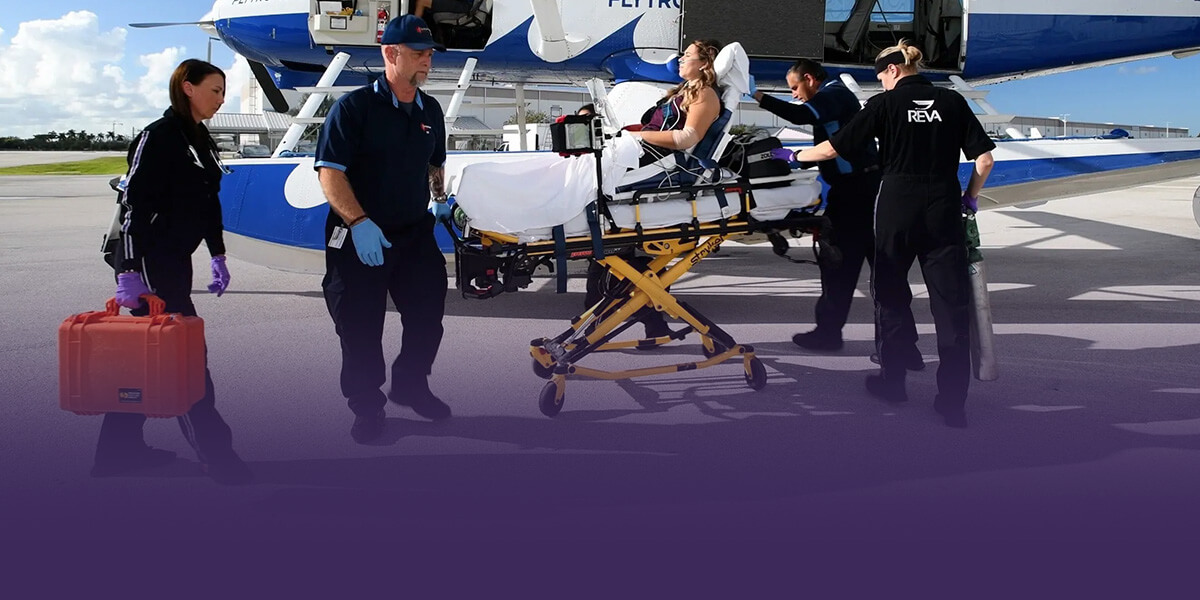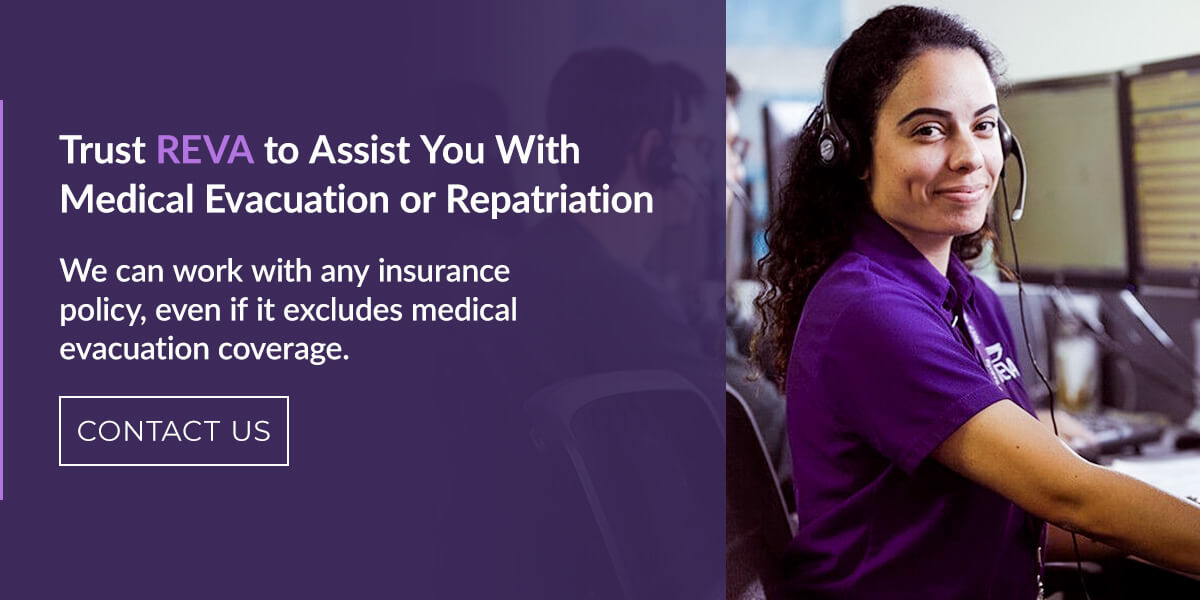
Travel insurance often covers various travel expenses when the unexpected occurs, but it doesn’t always cover medical evacuation. Medical flight transportation involves moving a patient from one healthcare facility to the next to receive a specific type of care. Emergency transportation services often occur when a traveler in a foreign country requires higher-quality care at another facility or in a different country.
Patients typically use air ambulance services when they require transport over long distances. Medical evacuation coverage is crucial because it helps individuals pay for medical evacuation or repatriation services in an emergency.
What Is Medical Evacuation Insurance Coverage?
Medical evacuation insurance provides coverage to individuals if they need an evacuation or repatriation. Medical evacuation refers to emergency transport to a capable hospital from a local facility. A patient typically requires medical repatriation when they need specialized care or long-term treatment in their home country after an illness or injury stabilizes.
How Much Is Medical Evacuation Out of Pocket?
The right coverage prevents individuals from paying high out-of-pocket medical evacuation costs. Paying for medical evacuation services can cost from tens of thousands of dollars to several hundred thousand dollars, and transportation from some countries is more expensive than others.
Medical evacuation within North America typically costs up to $25,000, and it can cost $250,000 or more when patients require evacuation from more remote or distant locations. Costs can also increase when patients require critical care.
Why Is Medical Evacuation Coverage Important?
Evacuation coverage is essential, but it’s rarely part of standard health plans. Obtaining medical evacuation coverage is crucial because it prevents individuals from paying high medical bills when they need emergency medical evacuation or repatriation. Having an evacuation insurance plan in place provides patients and their families with peace of mind.
Every traveler should consider medical evacuation insurance, especially if they will be in an area with limited medical resources. Some examples of candidates for medical evacuation coverage might include:
- Families taking vacations or cruises outside their countries.
- Foreign aid workers or missionaries.
- Business travelers working overseas.
- Travelers headed to secluded areas.
- Military personnel without evacuation coverage.
What Does Medical Evacuation Insurance Cover?
Some medical insurance and travel medical insurance policies cover transportation to the nearest acceptable hospital or medical facility in an emergency. However, an acceptable facility isn’t always the best facility.
Medical evacuation insurance covers evacuation to a patient’s preferred hospital. An individual’s chosen hospital could be the nearest high-quality hospital offering the best care, or it could be a hospital in their home country. Medical evacuation can cover the following costs associated with air evacuation:
- Emergency transportation costs, such as medical evacuation flights and ground transportation.
- Medical repatriation flights to an individual’s home country.
- Medical escort services.
- Friend or family member travel costs.
- Bedside companion costs.
- Travel costs for a patient’s children.
- Remains transportation.
Medical evacuation coverage typically covers the cost of transporting patients to the nearest medical facility or hospital of their choice. This applies if they require emergency care while traveling or must return to their home country for care. It also covers medical escort services if you need medical attention during your flight.
Some policies pay for a patient’s friend or family members to fly and stay with them while they receive treatment. There’s typically a hospital stay requirement, which means a facility must hospitalize a patient for a certain number of days for it to cover a loved one’s travel costs. A policy may also cover hotel and meal costs for a patient’s bedside companion.
Medical evacuation coverage can also cover repatriation costs if an individual passes away abroad. This benefit covers the cost of transporting remains home to the deceased individual’s family.
When Do You Need Medical Evacuation Insurance?
You should obtain medical evacuation insurance before traveling abroad or to remote United States locations. This type of coverage is necessary if you become ill or injured in another country or a remote location and must reach a high-quality medical facility or travel to a hospital in another country.
Travel medical insurance only covers certain medical expenses in another country, such as hospital stays and treatments. Medical evacuation insurance allows you to reach quality hospitals and travel home for treatment if necessary.
How You Will Be Transported
Medical evacuation teams transport patients safely and quickly via commercial flights or private aircraft. A medical escort team typically escorts a patient on a commercial flight, traveling with them and providing medical attention if necessary. A private air ambulance team transports patients on a private aircraft and provides bed-to-bed service.
If you request medical evacuation, you can expect a medical team to pick you up at the hospital and help you board a fully medically equipped aircraft. You receive medical attention as needed and remain secure and safe on a medical stretcher. Upon landing, the team transfers you to the next hospital via dependable ground transportation.
Important Questions to Ask When Purchasing a Medical Evacuation Insurance Policy
Before purchasing a medical evacuation insurance policy, you should ensure it meets your needs. Ask the following questions about each plan you consider:
- Does the plan cover evacuation to the nearest appropriate hospital or allow you to choose the facility?
- Are any preexisting conditions excluded from the plan?
- Does the plan mention any adventurous travel or activity restrictions, such as whitewater rafting or skydiving?
- Are there age restrictions on the policy?
- What is the policy’s limit on medical evacuation coverage?
- Does the plan cover serious conditions?
The amount of coverage and medical condition stipulations vary between insurance companies. Understanding an insurance policy’s restrictions and how much coverage it provides helps you prepare for travel or handle unexpected medical emergencies.
Make sure the policy you purchase meets your needs and covers the cost of medical evacuation from your planned destinations. It’s also important to consider who makes your evacuation decisions if you are unable to and ensure they understand your policy’s details.
How to Add Medical Evacuation Coverage to Your Travel Insurance
Standard travel insurance policies sometimes include medical evacuation insurance. If a plan does not have coverage upfront, travelers can modify their policies before departing their home country. Most programs provide this coverage for travelers for as little as several days or as long as one year, depending on the policy.
Premium insurance add-ons can help cover repatriation costs for the trip home and the choice of medical providers or facilities. Adding evacuation coverage can be as easy as contacting your travel insurance provider. The cost of added insurance varies by company.
REVA accepts all major medical insurance providers, and we navigate the insurance environment to help patients find the best payment solutions. We verify insurance plans, provide patients with their financial options, prepare insurance claims and follow claims until payments process. Our seamless insurance process helps patients receive medical evacuation and repatriation services without paying a large bill. We can work with any insurance policy, even if it excludes medical evacuation coverage.
Trust REVA to Assist You With Medical Evacuation or Repatriation
When a life is at stake, time is everything. That’s why REVA stands ready to help in the most critical medical emergencies. Our experienced and caring staff can arrive at a scene quickly and transport you to the nearest quality facility or a hospital in your home country.
We’ll stand by your side during the entire bedside-to-bedside process, from arranging transportation and providing qualified medical professionals to taking care of your insurance claim. Our staff is available to help you 24 hours a day, seven days a week. Call 954-730-9300 or contact us online to learn more about our air ambulance and repatriation services.


